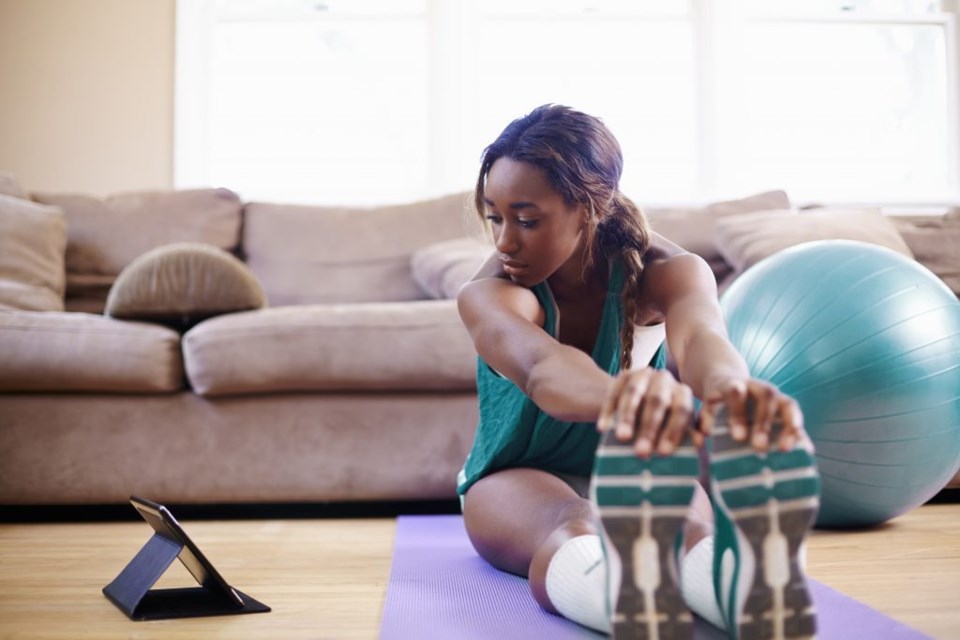Many fitness centres across Canada have closed their doors in an effort to prevent the spread of the novel coronavirus.
Chain gyms, including Goodlife Fitness, Anytime Fitness, Planet Fitness, Hone Fitness, LA Fitness and the YMCA, have all temporarily closed, as have independent fitness studios.
It can be challenging enough to stay motivated to work out at the best of times, let alone at home and possibly alone.
But the shutdowns have prompted both instructors and gymgoers to come up with creative ways to stay fit during the pandemic.
Here are some tips on how to stay on top of your workouts while fitness centres are closed.
Change your mindset
For those who need an incentive to work out at home, Cassie Day, a Toronto-based personal trainer and owner of All Day Fit, said it’s important to think about what exercising does for your health.
Working out is not only beneficial for your physical health, she said, but for improving your mental well-being, too.
“Stress is a silent killer of health,” Day said.
“We live in a chronically stressed-out society –– especially right now. The best thing we can do is manage our stress, and workouts are a great tool for this.”
Research reflects Day’s stance, as studies suggest regular physical activity has positive effects on our overall well-being, including mental health.
Vancouver-based psychologist and Anxiety Canada board director Melanie Badali said exercise helps boost our mood by increasing serotonin, which is a brain neurotransmitter known as the “happy hormone.”
“Exercise can help provide us with a sense of accomplishment,” Badali said.
“If we choose a form of exercise we enjoy, we can also experience a sense of pleasure. Having something positive to ‘do’ for our health, such as exercise –– in addition to washing our hands and practising physical distancing –– could be psychologically beneficial.”
Make a plan — and stick to it
It’s easy to prioritize work commitments, house cleaning and taking care of others during the outbreak, and forget about yourself. Creating a workout schedule for the week is a great way to be motivated and stay on track, Day said.
“It’s very easy to be hyper-focused on work right now with no distractions at home,” she said.
Day said carving out time in your agenda to move your body can hold you accountable and help you follow through with exercise. The trainer also recommends setting an alarm to remind yourself to exercise when you’re done work.
Get an accountability partner
If you have a hard time holding yourself accountable, Day said finding an online community or workout friend can help you stay committed to exercising.
Working out with a group over video chat, like Zoom or FaceTime, will also help you maintain connections with the outside world while practising social distancing and self-isolation.
“Everything’s better when you’re exercising with a partner, especially motivation-wise,” Day said.
An online community or workout buddy can also satisfy our need for connection and social gathering, which going to a gym usually provides.
Use social media
Many fitness experts are using social media platforms like Instagram and Facebook for personal training and leading virtual workout classes.
Goodlife Fitness, for example, is posting videos on Instagram of different exercises people can do at home without equipment.
Hundreds of thousands of Instagram, Twitter and Facebook users have posted videos taking on the viral challenge.
Exercises without equipment
Whether you don’t want to spend the money or you don’t have the space, Toronto-based fitness expert and owner of Bang Personal Training, Geoff Girvitz, said you can still break a sweat without equipment.
Girvitz said you just need to incorporate some kind of pushing, pulling, squatting, hinging and lunging motions to get a full-body workout.
“If you’re doing all this stuff, you’re covering a lot of fundamental movement basics, especially if you add locomotion, which could be anything from walking to running,” he said.
You can do push-ups, for example, by leaning your hands against a wall to make it easier, or on the ground for more of a challenge.
Girvitz also recommends integrating exercise into daily activities like getting water or warming up food in the microwave. As you wait, you can do calf raises, jumping jacks or squats.
If you are looking to purchase workout equipment for your home, Day said bands and gliding disc sliders are affordable and accessible options.
But no matter what you use or don’t use while working out at home during the coronavirus outbreak, Day said simply moving your body is enough.
“Exercise increases our overall health and sense of well-being, which puts more pep in our step every day,” she said.
Questions about COVID-19? Here are some things you need to know:
Health officials caution against all international travel. Returning travellers are asked to self-isolate for 14 days in case they develop symptoms and to prevent spreading the virus to others.
Symptoms can include fever, cough and difficulty breathing — very similar to a cold or flu. Some people can develop a more severe illness. People most at risk of this include older adults and people with severe chronic medical conditions like heart, lung or kidney disease. If you develop symptoms, contact public health authorities.
To prevent the virus from spreading, experts recommend frequent handwashing and coughing into your sleeve. They also recommend minimizing contact with others, staying home as much as possible and maintaining a distance of two metres from other people if you go out.
For full COVID-19 coverage from Global News, click here.
Follow @AmandaPopetv- Global News



